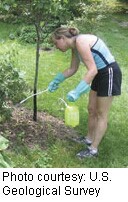- 7 Best Breads for Maintaining Stable Blood Sugar
- Gelatin vs. Collagen: Which is Best for Skin, Nails, and Joints?
- The Long-Term Effects of Daily Turmeric Supplements on Liver Health
- Could Your Grocery Store Meat Be Causing Recurring UTIs?
- Are You Making This Expensive Thermostat Error This Winter?
- Recognizing the Signs of Hypothyroidism
- 10 Strategies to Overcome Insomnia
- Could Artificial Sweeteners Be Aging the Brain Faster?
- Techniques for Soothing Your Nervous System
- Does the Water in Your House Smell Funny? Here’s Why
Pesticide Exposure Tied to Diabetes Risk


Exposure to pesticides may increase your risk of diabetes, a new analysis suggests.
After reviewing 21 previous studies, researchers found exposure to any type of pesticide was associated with a 61 percent increased risk for any type of diabetes. The increased risk for type 2 diabetes — the most common type — was 64 percent, the investigators found.
Scientists believe genetic and environmental factors are involved in the development of diabetes. Although the current findings don’t prove pesticides cause diabetes and more research is needed, the study authors said their findings add to the growing body of evidence that contaminants in the environment play a key role in the development of the disease.
“This systematic review supports the hypothesis that exposure to various types of pesticides increases the risk of diabetes,” wrote study authors Giorgos Ntritsos, from the University of Ioannina School of Medicine in Greece, and Dr. Ioanna Tzoulaki and Dr. Evangelos Evangelou, from Imperial College London.
“Analyzing each pesticide separately suggests that some pesticides are more likely to contribute to the development of diabetes than others,” the authors concluded.
The following chemicals were linked to an increased risk of diabetes, according to the researchers: chlordane, oxychlordane, trans-nonachlor, DDT, DDE, dieldrin, heptachlor and HCB.
The review included 21 observational studies (with a total of almost 67,000 people) that investigated a possible link between exposure to pesticides and diabetes. The researchers also conducted a specific analysis that focused solely on type 2 diabetes. Most of the studies measured pesticide exposure with blood or urine analyses, which are considered very accurate methods, the researchers said.
The findings were presented Tuesday at the annual meeting of the European Association for the Study of Diabetes in Stockholm, Sweden. Data and conclusions presented at meetings are usually considered preliminary until published in a peer-reviewed medical journal.
More information
The U.S. Environmental Protection Agency has more on the health risks of pesticides.
Source: HealthDay
Copyright © 2026 HealthDay. All rights reserved.










